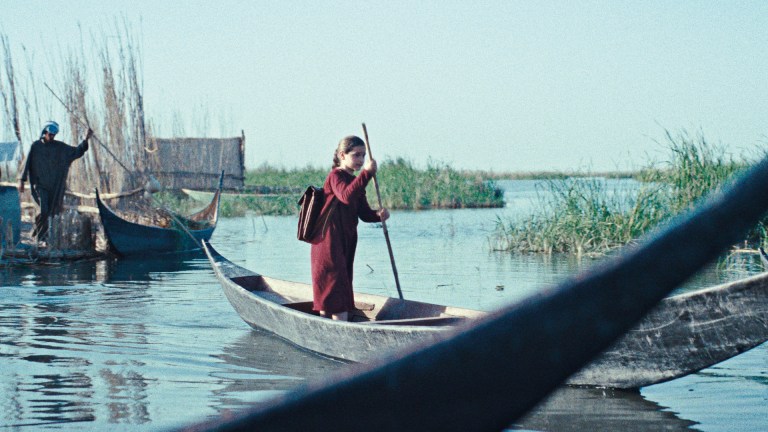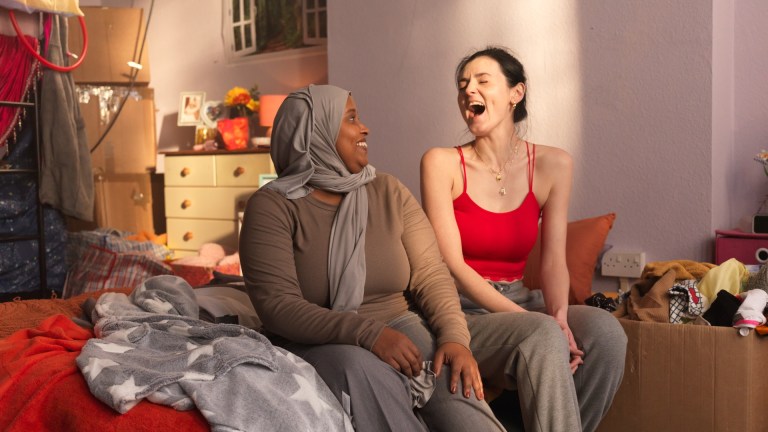Christmas socks usually come out once a year but The Big Issue has dug to the bottom of its laundry basket in honour of Emilia Clarke.
“Amazing!” she squeals as she glances at my ankles. “They look fabulous.”
They are. The red and white striped pair look like they’d be worn by the most dapper of elves in Santa’s workshop. It’s an elf, of sorts, that Clarke plays in Last Christmas. Kate has stalled at a crossroads in life, increasingly isolated from friends and family. Working at a Christmas shop in Covent Garden – fancy dress compulsory – she herself has been drained of the true spirit of the season.
The last time we saw Clarke on screen, power-crazed Daenerys, Queen of the Dragons, was raining terror upon King’s Landing in the devastating finale of Game of Thrones. Today, in a London hotel suite, Clarke is as bright as a bauble, enthused and energised, curled up on a couch not wearing any socks at all.
Last Christmas is a million leagues away from Game of Thrones but Kate still has a battle to fight, even if the demons she is wrestling are of a less literal kind.
“She’s a lady on the run,” Clarke says. “She’s on the run from her childhood and she’s also on the run from her adulthood. That in-between state is one that I absolutely related to.”
Estranged from her Eastern Bloc-born parents, Kate has no permanent home and sofa-surfs between exasperated friends, sometimes sleeping in the back of the Christmas shop.
“I’ve got a lot of friends who are in the same boat,” Clarke says. “Forever they are roaming and there’s something profoundly unsettling about that. I’ve got one particular friend who is continually on the move. He’s looking for a place to call his own and he doesn’t have the means to do it.
“There’s flat-sharing and all of these things but it’s harder and harder for people to find somewhere to live. I’m seeing more homeless people now than I have ever seen in my entire life. There’s more people living at home with mum and dad – if they decided they didn’t want to do that or they’re not fortunate to have a mum and dad, you’re homeless.”
Clarke remembers how support from her own parents was a lifesaver when she moved from the family home in Oxfordshire to London for drama school.
“That was back in the day when renting a room in London was not £800 a month, with a student loan it was bearable. I worked three jobs to pay the rent then would still call up my parents and say, ‘I just was wondering… could I have…?’ And they have already given me everything their entire life. Definitely the first thing I did when I got money was give it back to them.” Kate’s mother Adelia, played by Emma Thompson (who also wrote the film), brought her children to the UK to give them a better life. Does a film about a migrant family seem significant at this moment?
“Hugely,” Clarke says. “When you’re a kid you don’t think for a second what your parents must have gone through, but the fear in which Kate lives day to day: you feel like you’re getting yourself settled, then Brexit happens and you start to see what you feared was always the case – you’re not wanted in this place that you sacrificed everything to get to. That’s incredibly relevant for now. Hate crimes are on the up, and it’s a sorry, sad state of affairs. I feel very privileged to tell a little bit of that story.”
Clarke returns to the sense of home meaning more than simply a roof and four walls, whether you are a young person trying to get on a property ladder, migrant or homeless.
“How can you ever be expected to get yourself together when you don’t have a room to call your own? Virginia Woolf, A Room of One’s Own – that’s the first rule of feminism!
“When you have a home you feel safer. When you have a space that is yours you feel protected. It’s really basic, really literal – it’s your space. You’re able to be yourself. How can you begin to get any self-worth if you don’t have a room you can fart in?”
Indeed. Last Christmas, as Clarke admits, is “100 million per cent” a glossy version of the current housing and identity crisis we’re wallowing in but that doesn’t make what it has to say about these things invalid. Beneath the shiny surface, the film tackles mental health, family breakdown and immigration – among the many reasons beyond the financial that lead someone to social exclusion and homelessness.
At the heart of Kate’s crisis is a health condition that almost killed her. She may be physically healed but scars run deep. Clarke can relate.
After completing filming on the first season of Game of Thrones in 2011, one morning Clarke felt like “an elastic band was squeezing my brain” and was immediately rushed to hospital. A subarachnoid haemorrhage led to brain surgery, and in intensive care Clarke couldn’t remember her own name for a week.
Another aneurysm had been found in a different part of her brain, one that could “pop” at any time. Two years later it had doubled in size and another operation was planned. The relatively straightforward procedure went wrong. Clarke was in hospital for over a month and it felt like her world was ending. While the success of Game of Thrones was turning her into a superstar, Clarke was living the darkest days of her life.
What was it that got her through?









